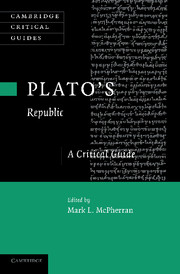Book contents
- Frontmatter
- Contents
- Acknowledgments
- List of contributors
- List of abbreviations
- Introduction
- 1 Socrates in the Republic
- 2 Platonic ring-composition and Republic 10
- 3 The Atlantis story: the Republic and the Timaeus
- 4 Ethics and politics in Socrates' defense of justice
- 5 Return to the cave
- 6 Degenerate regimes in Plato's Republic
- 7 Virtue, luck, and choice at the end of the Republic
- 8 Plato's divided soul
- 9 The meaning of “saphēneia” in Plato's Divided Line
- 10 Plato's philosophical method in the Republic: the Divided Line (510b–511d)
- 11 Blindness and reorientation: education and the acquisition of knowledge in the Republic
- 12 Music all pow'rful
- Bibliography
- Index of passages
- Index of names and subjects
11 - Blindness and reorientation: education and the acquisition of knowledge in the Republic
Published online by Cambridge University Press: 04 February 2011
- Frontmatter
- Contents
- Acknowledgments
- List of contributors
- List of abbreviations
- Introduction
- 1 Socrates in the Republic
- 2 Platonic ring-composition and Republic 10
- 3 The Atlantis story: the Republic and the Timaeus
- 4 Ethics and politics in Socrates' defense of justice
- 5 Return to the cave
- 6 Degenerate regimes in Plato's Republic
- 7 Virtue, luck, and choice at the end of the Republic
- 8 Plato's divided soul
- 9 The meaning of “saphēneia” in Plato's Divided Line
- 10 Plato's philosophical method in the Republic: the Divided Line (510b–511d)
- 11 Blindness and reorientation: education and the acquisition of knowledge in the Republic
- 12 Music all pow'rful
- Bibliography
- Index of passages
- Index of names and subjects
Summary
Education is not, according to Socrates, “what some people boastfully profess it to be,” when they say they can “pretty much put knowledge (epistēmē) into souls that lack it, like putting sight into blind eyes” (518b8–c2). On the contrary, it “takes for granted that sight is there, though not turned in the right way or looking where it should look, and contrives to redirect it appropriately” (518d5–7). Properly conceived, education is the craft concerned with “this very turning around … with how this instrument [with which each of us learns] can be most easily and effectively turned around, not of putting sight into it” (518d3–5) – where the instrument in question is reason (logos) or the rational element (to logistikon) (580d8). Together with appetite (439d6–7), spirit (439e2–3, 581a9–b4), and perhaps a few other elements (443d7–8), reason constitutes the embodied human soul. Consequently, education cannot accomplish its task of reorienting reason without reorienting the whole soul, any more than an eye can be turned around except by turning the whole body (518c6–8). Primarily targeted on the reason, Platonic education is thus forced to extend its purview to appetite and spirit. In the Republic, this part of education is discussed first, in Books 2 and 3. But, since it does not involve the acquisition of knowledge (522a3–6), we will keep it offstage until the final act, so as to focus on Platonic education's primary target and on the perplexing contrast Socrates draws between reorienting it and curing its blindness.
Keywords
- Type
- Chapter
- Information
- Plato's 'Republic'A Critical Guide, pp. 209 - 228Publisher: Cambridge University PressPrint publication year: 2010
- 2
- Cited by



